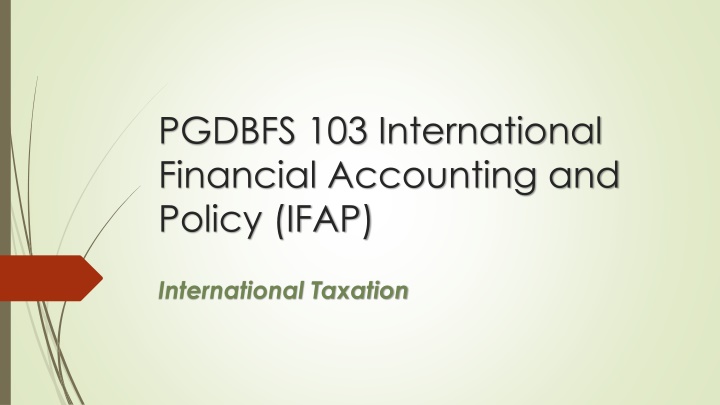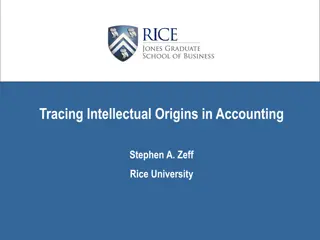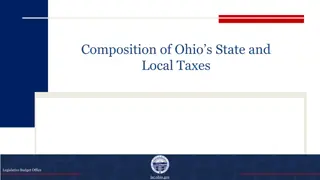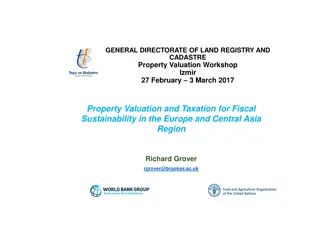
International Financial Accounting and Policy: Managing Taxes and Impacts on Business
Multinational corporations face various types of taxes, focusing on income tax, withholding taxes, and value-added taxes. Understanding tax implications is crucial for effective financial management and compliance with laws. Different countries offer incentives through tax concessions to attract foreign investments, influencing tax planning strategies for MNCs.
Download Presentation

Please find below an Image/Link to download the presentation.
The content on the website is provided AS IS for your information and personal use only. It may not be sold, licensed, or shared on other websites without obtaining consent from the author. If you encounter any issues during the download, it is possible that the publisher has removed the file from their server.
You are allowed to download the files provided on this website for personal or commercial use, subject to the condition that they are used lawfully. All files are the property of their respective owners.
The content on the website is provided AS IS for your information and personal use only. It may not be sold, licensed, or shared on other websites without obtaining consent from the author.
E N D
Presentation Transcript
PGDBFS 103 International Financial Accounting and Policy (IFAP) International Taxation
International taxation Taxes - one of the most significant costs incurred by business enterprises. Well managed companies try to minimize taxes they pay, while making sure they are in compliance with applicable laws. Multinational companies (MNCs) take taxation into account when making investment decisions. For example: Legal form of operations Branch Vs subsidiary Franchise arrangement Method of financing Equity or debt
Types of taxes Multinational corporations are subject to various different types of taxes, such as: Property taxes (e.g. Stamp duty, capital gain taxes) Payroll taxes (PAYE) Sales taxes (e.g. VAT, NBT) Exercise duties Earning based taxes (e.g. income tax, withholding tax) The taxes that usually will have the largest impact to companies are the earning based taxes.
Income tax A direct tax on business income Different tax rates in countries - opportunity for tax planning for MNCs. Income tax rate could also vary depending on the type of business/industry. For example in Sri Lanka : Tobacco related companies -taxed at 40%, agricultural companies - taxed at 14%, other businesses - taxed at 28%. Rules applied in the determination of taxable income also have an impact on the amount of tax a corporate will end up paying. E.g. expenses disallowed for tax purposes. Governments often compete to attract foreign direct investments through income tax concessions. Such incentives may include: Lowering of the corporate income tax rates. Becoming Tax havens E.g. Bermuda, Bahamas, Cayman Islands Providing tax holidays to foreign direct investors. E.g. BOII approved companies in Sri Lanka. Creation of special economic zones. E.g. free trade zones established in the Katunayake area of Sri Lanka. Allowing preferential treatment in the calculation of income taxes. E.g. allowing 200% capital allowances for investments in capital assets (like, plant and machinery)
Withholding taxes These are taxes withheld by the party who is making a payment relating to prescribed services, investment returns etc, whom will then directly remit the taxes to the tax authorities. Example: Banks deducting WHT s on interest income. WHT deducted on dividend payments to foreigners. WHT on foreign payments made in relation to technical advises, consultancy etc Withholding taxes also vary between countries and also could vary between different types of payments within a country. This creates opportunity for tax planning to minimize overall taxes. For example, if the WHT rate on interest payments is less than on dividend payments, it may be beneficial for the investors to inject funding as loans rather than as equity. Further, when the WHT rate on services (eg royalty fees, technical fees etc) are less compared to dividends, the foreign parent companies may benefit by charging such fees to its foreign subsidiaries, rather than receiving all profits as dividends.
Value-added taxes Countries generate a significant amount of revenue through VAT. Not a tax that is directly applied against the income/profits hence is called as an indirect tax. This tax is levied on the value added at each stage in the production or distribution of a product or service. Refer Illustration in the tutorial VAT is eventually born by the end consumer, and it only a pass through cost to the produces and intermediaries. Indirect taxes like VAT are not based on income/wealth therefore viewed as inequitable taxes.
Tax jurisdictions If two countries assert the right to tax the same income, double taxation will arise. Therefore determination of which country has the right to which income is important. One tax jurisdiction issue relates to the taxation of income earned overseas, known as foreign source of income. There are two approaches taken on this issue. Worldwide approach All income of a resident is taxed by that country regardless of where the income was earned. This is the common approach taken by most countries. Territorial approach Under this approach, only the income earned within the borders of the country is taxed. Not many countries currently follow this approach.
Source, Citizenship and Residence A second issue relating to tax jurisdiction is the basis of taxation. Countries generally use source, citizenship, residence or a combination of this three for determination of the jurisdictional authority over tax. Source of income Almost all countries exercise jurisdictional authority to tax income where it is earned regardless of residence or citizenship of the recipient. Citizenship Under the citizenship basis of taxation, citizens are taxed by their country of citizenship regardless of where they are resident or the source of the income. US is a country that uses the citizenship basis for taxation, therefore a US citizen who work and live abroad are still liable to file taxes in the US based on their worldwide income. Residence Under the residence approach, residents of a country are taxed by the country in which they reside, regardless of their citizenship or where the income was earned. For example in Sri Lanka any person who resided in Sri Lanka for more than 183 days during any given tax year will be liable to pay income taxes in Sri Lanka.
Double taxation The combination of worldwide approach to taxation and the various bases for taxation can lead to overlapping tax jurisdictions that can lead to double or triple taxation. For example a U.S. citizen residing in the UK with investment income in Sri Lanka might be expected to pay taxes on the investment income to the US (on the basis of citizenship), UK (on the basis of residence) and Sri Lanka (on the basis of source). E.g (2). An Australian company operating in SL earns a profit of USD1000, it will be subject to 28% income tax in SL, 10% remittance tax when transferring the profits to Australia, and then 30% corporate tax in Australia. Accordingly, the Australian company effectively pays 55% of its profits as taxes. Such a high tax rate would be prohibitive on international trade, the company made decide to operate only in Australia, which would limit its taxes to 30%.
Double taxation relief An important goal of national tax systems is to be neutral on business, investment and consumption decisions. Double taxation relief is important to achieve this objective. Commonly applied such mechanisms include: Foreign tax credits Who should give us its rights to avoid double taxation? Norm is Source should take precedence over Residence in deciding the tax jurisdiction. Foreign tax credits can be given in several ways: Exempting the source of foreign income from taxation. Allowing taxes paid in the foreign country as a deduction against taxable income in the home country. Allowing taxes paid in the foreign country as a deduction against income tax liability in the home country. Tax treaties Tax treaties are bilateral agreements between two countries regarding how companies and individuals from one country will be taxed when earning income from the other country. Treaties reduce the possibility of double taxation through the clarification of tax jurisdiction.
Treaty shopping Treaty shopping generally refers to a situation where a person, who is resident in one country (say the home country) and who earns income from another country (say the source country), is able to benefit from a tax treaty between the source country and yet another country (say the third country). This situation often arises where a person is resident in the home country but the home country does not have a tax treaty with the source country. Different countries attack this problem in different ways. The U.S. generally includes in its tax treaties with other countries specific rules that limit the benefits under the treaty in certain circumstances.
Tax incentives Governments often use the national tax law to achieve certain economic, social, political objectives. Following are some tax incentives used as tools in this regard. Tax holidays e.g. Tax holidays given to BOI companies, 25 year income tax holiday given to the Chinese entity that bought the Hambanthota port, 10 year tax holiday given to Shangri-La hotels. Incentives for income earned in foreign currency e.g. In SL the first Rs15Mn income earned in foreign currency is exempt from tax and the remainder is taxed at a concessionary rate. Export incentives preferential tax rates given to export oriented companies. Free trade zones e.g. creation of specialized economic zones, where the companies operating there are given tax benefits. Geographical tax benefits e.g. tax benefits given to developing countries by first world countries (GSP+), 200% capital allowance benefit given to companies investing in the Northern Province in SL.






















